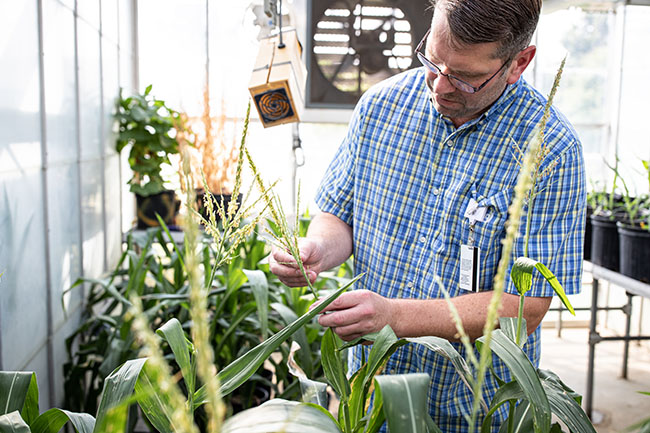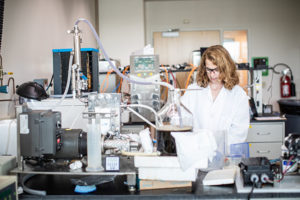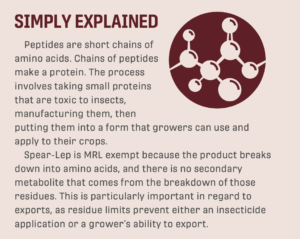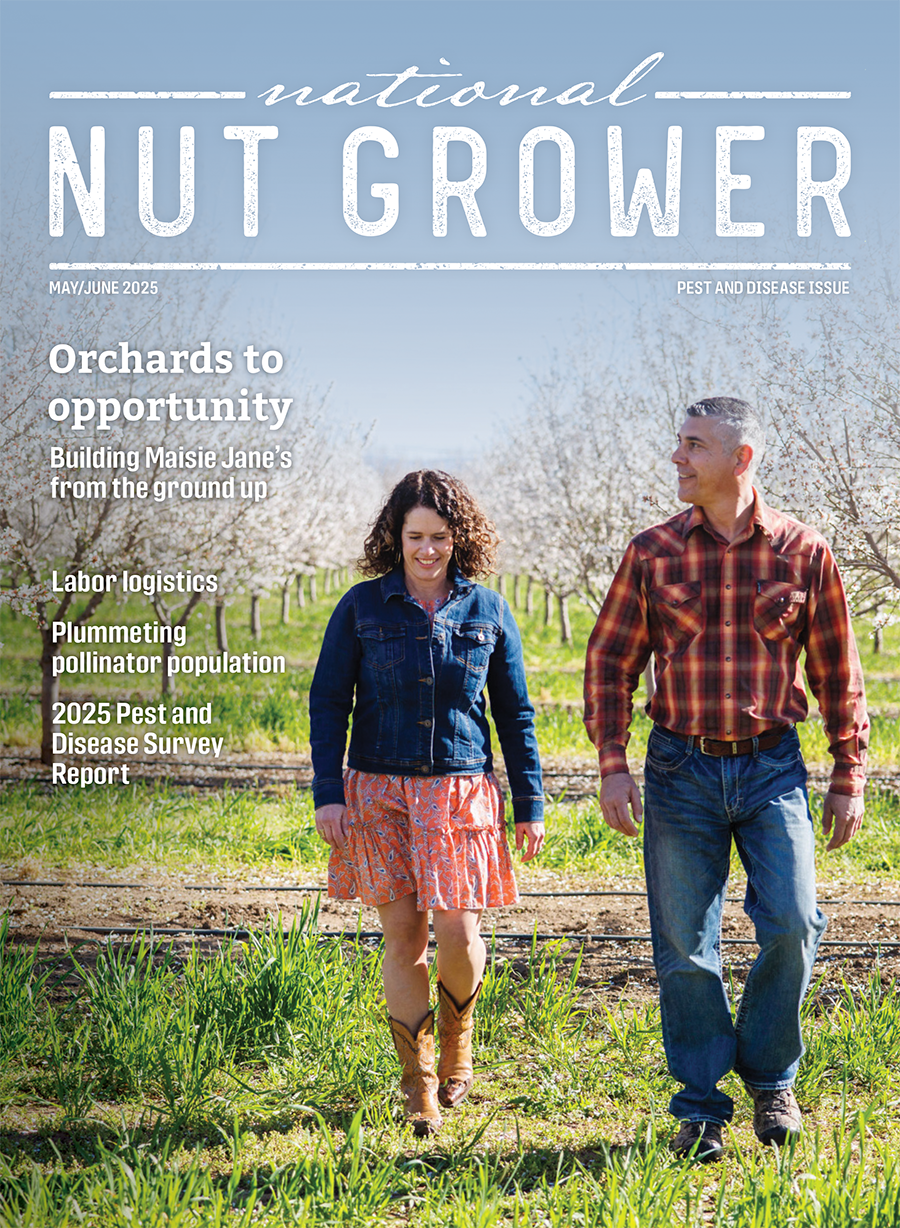
Winter 2022
Peptides as insecticides
There’s a sliver of transformation happening within the agricultural insecticide market. Aside from pest control practices changing with the increased implementation of integrated pest management, the chemistries themselves have been overdue for a change since the introduction of the diamides.
Vestaron is looking to disrupt the insecticide market by not only offering something new, but something that can be included in rotations to help with resistance issues to current products. The company’s entire platform is built on peptide-based insecticides.
How it works
“We take naturally occurring peptides and engineer them for performance,” explained Ben Cicora, senior vice president of sales and marketing at Vestaron. “We carve out everything that may be toxic to humans, fish, birds, pollinators, and just focus on the insecticidal activity, and we can express that to where it will perform much like a synthetic.”
Vestaron’s initial product Spear-Lep has been measured against methoxyfenozide and chlorantraniliprole in tree nuts for use against navel orangeworm and peach twig borer – as well as other lepidopteran pests in other crops – and is a safer, more sustainable alternative to the synthetics, but is also able to save these chemistries by being included into the rotation.
As resistance builds to the use of synthetic pesticides, growers lose options.
“Our technology is basically extending the life of those, but also giving growers safe, sustainable alternatives to rotate into their practices,” said Cicora.
Spear-Lep is the first of Vestaron’s slate of active ingredients that are hitting the market. It is maximum residue limit (MRL) exempt, has a four-hour reentry interval, and is safe on pollinators and other beneficials.
“You can basically spray it the morning of harvest,” Cicora said.
Spear-Lep is not organic, and it would be difficult to classify it as such because of the way the peptides are engineered. Though classified as a biological, the peptides are engineered to perform like synthetics, with which growers are more accustomed and familiar.
This new technology comes with a new, novel mode of action, garnering it a new Insecticide Resistance Action Committee (IRAC) group number. Vestaron’s next active ingredient, Basin, which is currently with the EPA and anticipates a late 2022 launch, also features a novel mode of action, with the expectations of the issuance of another new IRAC group number.
“The last novel neuromuscular mode of action was the diamides back in 2007. Right now, there’s just this dearth of innovation in agricultural insecticides,” said Cicora, “and the resistance factor is becoming more at play in many crops.
It has been a two-active-ingredient rotation for the last decade … Spear-Lep gives growers another option to rotate into those applications within tree nuts, and gives growers an opportunity to continue to stave off any sort of potential resistance that could develop.”
Cicora also noted that not all biologicals are created equal, to the extent that most biologicals are a microbial mix or plant extract with an unknown mode of action, which IRAC places into a category of other unknowns. This isn’t the case for Spear-Lep, which now falls under IRAC 32.
“We know exactly how, where and why we’re affecting an insect nervous system,” said Cicora. “We target specific receptors in insects so that the mode of action is always going to be known to the grower.”
Both Spear-Lep and Basin are active in the nicotinic acetylcholine receptor, which is in the central nervous system of the insect and is the same receptor where neonicotinoids and spinosyns work. Vestaron’s active ingredients, however, work on different sites in the receptor, so there isn’t any cross resistance.

Company on the climb
Vestaron was founded in 2005 and was primarily a research and development company. Its initial goals were bringing active ingredients through development and EPA registration, licensing them or selling the technology to another major company, and then using the proceeds to finance the next active ingredient in the lineup. But in 2017, and with two products making their way out of the EPA, the company’s board found it a good time to make the official switch to commercial.
The years that followed included adding new senior talent and structuring the business into a commercial model. Spear-Lep was launched in 2020 on the West Coast in high-value specialty crops and gained good traction, making 2021 a ramp up year.
Revenue doubled in 2021, and the company and its product gained confidence with growers and independent pest control advisors (PCA).
“A lot more PCAs started to get comfortable with the data we were producing with universities, cooperators, etc., and growers were seeing it on more of a larger scale,” Cicora said.
2021 also showed how the product performed in a high pressure season. After this season’s success and last season’s success in lower pressure, Vestaron and allied professionals alike have seen Spear-Lep perform in line with Intrepid and Altacor, allowing growers and PCAs to be more confident in having a novel product that can be added to the rotation.
“And that’s really where we see the benefit to growers long term,” said Cicora.
Though the final data is not yet in for 2021, Vestaron estimates Spear-Lep use on 100,000-150,000 acres of tree nuts for control of navel orangeworm, peach twig borer and codling moth, snagging market share for pistachio, almond and walnut.
“Spear-Lep is the first, and now when we launch Basin in late 2022 into 2023, they’re going to have another new tool that they can work into rotation,” said Cicora.
Growers can expect the new active ingredient to show up in field days and research trials in 2022.
In addition to the company’s growth, Vestaron kicked off its sustainability direction this year. The company partnered with Pollinator Partnership and will be donating $30,000 over three years to the Bee Friendly Farming certification initiative to promote pollinator health, awareness, and to help get the message out to growers that sustainable alternatives are available. It is also open to additional partnerships that can help define ways in which growers can have a softer footprint when it comes to their insecticidal applications.
With hundreds of trials in 13 countries, Vestaron is expanding internationally and anticipates registration in Mexico this year, an introduction to Europe in 2024 and has begun the registration processes with efficacy work in both South and Central America.
Photo: A Vestaron expert evaluates product results in the lab. Photos: Vestaron










